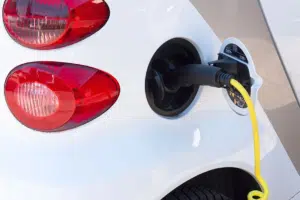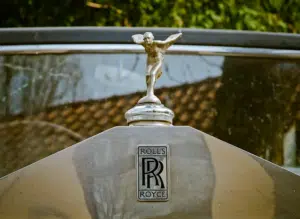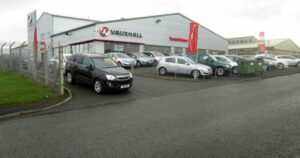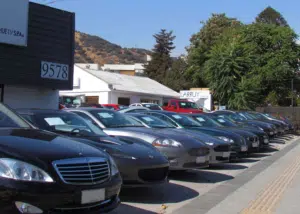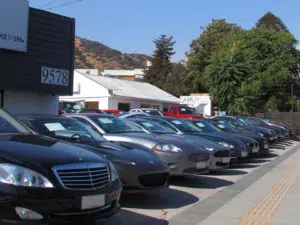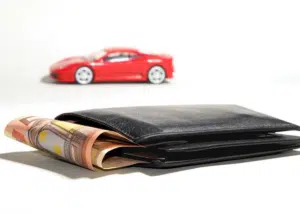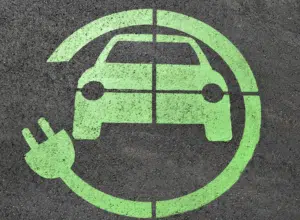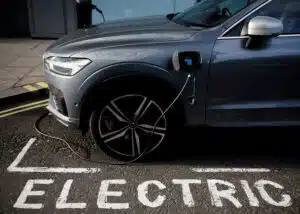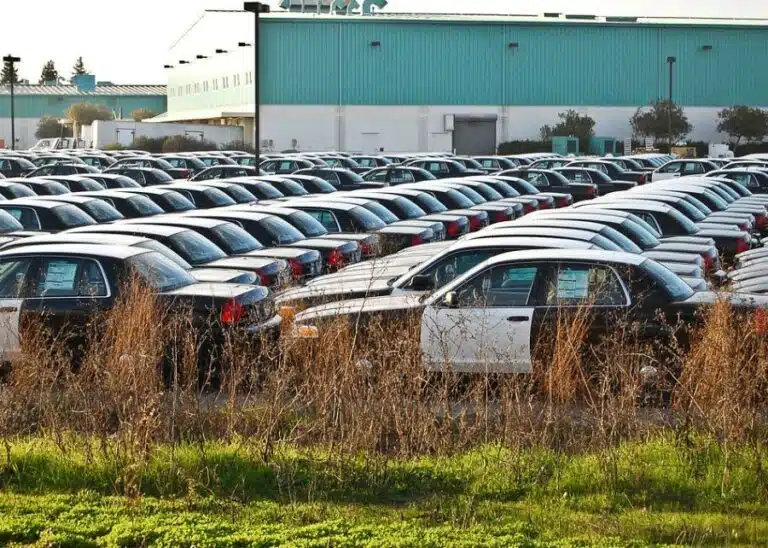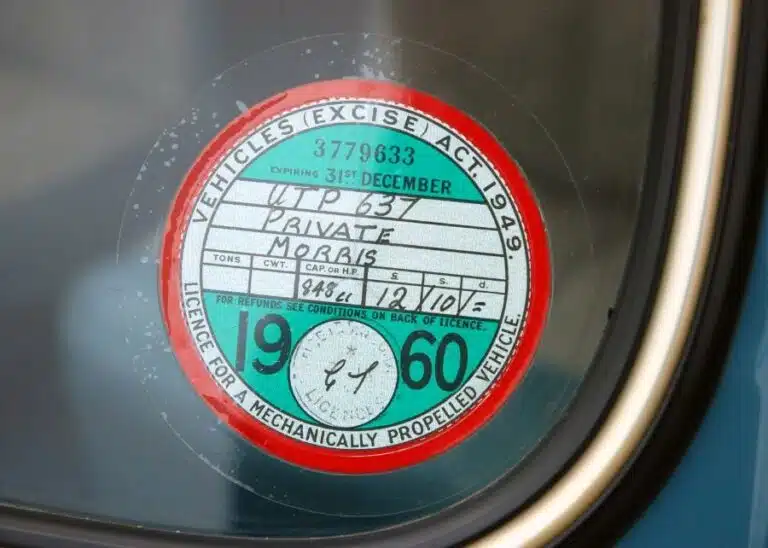You might be surprised to learn that you can actually sell a car even if it has some damage to it. Well, depending on the extent and type of damage, and your personal preference, you could sell your car to a specialist buyer, privately or even for parts.
These are just some of the main ways that you sell your damaged car. You will need to weigh the pros and cons of each option, and decide what works best for you and we’re here to help.

How to sell my damaged car?
There are many ways to sell a damaged car, depending on the extent of the damage, the value of the car, and your preferences. Here are some possible options that you may want to explore:
Sell your damaged car to a dealer such as GoodBye Car or CarConverter could be one option. These websites offer quotes on cars in any condition, and they will collect your car from your door for free. You can get a valuation in seconds by entering your registration plate and some details about the damage. You can also choose to receive the payment in cash or bank transfer too, whichever you prefer.
You could also choose to sell your car privately. For example, you could advertise your car on platforms such as Gumtree, Facebook, or by putting a ‘for sale’ sign in the car window. So long as your honest about the condition of the car and provide clear photos and descriptions of the damage, you’ll be sorted.
As well as those options above, you also have the option to sell your damaged car to a scrap yard. If your car is too damaged to be repaired or has no resale value, you can sell it to a scrap yard that will pay you for the scrap metal and parts. You can find a local scrap yard online and they will usually tow your car away for free. You may need to provide proof of ownership and remove any personal belongings from the car before selling it.
Sell your damaged car to an online car buyer such as Peddle, Copart Direct, CarBrain.com, DamagedCars.com, or CarBuyerUSA.com. These websites specialize in buying damaged cars and offer instant quotes based on the make, model, year, mileage, and condition of the car. They will also arrange the pickup and delivery of the car and pay you on the spot or by check. Some of these websites may require you to upload photos and documents of the car and the damage.
Selling an insurance write off car
If you’re car has been written off by your insurance company, the first thing to do is not to panic. Insurance write offs aren’t as bad as you might think and you could actually sell it or repair it, depending on the category of write-off and the condition of the car.
For example, let’s take a look at some of the options below:
If your car is a category A or B write-off, you cannot sell it or repair it. These cars are deemed irreparable and must be crushed or recycled. According to the RAC, you should send the log book to your insurance provider and inform the DVLA that your car has been written off.
If your car is a category S or N write-off, you can sell it or repair it, but you need to follow some steps. First off, you should send the complete log book to your insurance provider and apply for a free duplicate log book using a V62 form, says the RAC. The DVLA will record your car’s category in the log book. You should also inform any potential buyers that your car is a write-off and provide them with a full history check too. Admiral also make a very good that you should make sure that your car is repaired to a roadworthy condition and passes an MOT test before using it or selling it.
If your car is a category C or D write-off, you can also sell it or repair it, but you don’t need to send in your log book or inform the DVLA. However, you should still inform any potential buyers that your car is a write-off and provide them with a full history check. You should also make sure that your car is repaired to a roadworthy condition and passes an MOT test before using it or selling it, says One Woman Owner.
You can sell your write-off car to a dealer, a private buyer, a scrap yard, or an online car buyer like ourselves, depending on the category and the value of your car. You can also buy back your write-off car from your insurance provider if you want to keep it or repair it yourself. If your car is a non-runner car, it’s not the end of the world and you could still end up getting a fair price for it.

What if my car is irreparable?
If your car is irreparable, it means that it has been damaged so badly that it cannot be fixed or that it would cost more to repair than the car is worth. Depending on the cause and extent of the damage, your car may be classified as a write-off by your insurance company.
When it comes to parting ways with your irreparable car, you have to accept a lower price and find a suitable buyer for it too. Whether you’re selling for parts or selling to a scrap yard of even an online buyer, you can always negotiate and who knows, the price offered maybe be more than you we’re expecting!
What paperwork do I need when selling a non-running or damaged car?
Selling a non-running or damaged car can be a hassle, but you can make your life just that little bit easier by having the right paperwork ready. Depending on where you live and who you sell your car to, the requirements may vary, but here are some common documents that you will need:
Title: The most important piece of paperwork that you’ll need to have when selling a non-running vehicle is the title. This is the document that proves that you own the car and have the right to sell it. Without the title, you may not be able to sell your car legally.
Bill of Sale: A bill of sale is a document that serves as a record of the sale and transfer of ownership of the car. It should include the names and addresses of the seller and the buyer, the date and price of the sale, the vehicle identification number (VIN), the mileage, and any other relevant information. A bill of sale can protect you from any disputes or liabilities that may arise after the sale.
Vehicle History Report: A vehicle history report is a document that shows the history of the car, such as previous owners, accidents, repairs, and recalls. It can help you prove the condition of the car and disclose any issues that may affect its value. You can obtain a vehicle history report from various sources, such as HPI Check or CarVeto, for a fee. How amazing is that! Hassle free report obtained quickly and efficiently.
Registration: Your car’s registration is another document that you’ll need to have when selling it. It shows that your car is registered with the DVLA and that you have paid the vehicle tax. You should also inform the DVLA that you have sold your car and update your records. You can do this online, says Damaged Cars Wanted or by filling out the relevant section of your V5C logbook and sending it to the DVLA.
These are some of the essential documents that you’ll need to have when selling a non-running or damaged car.

What To Expect When Selling A Faulty Car
If you’re thinking of selling a broken car that is faulty and not ship shape anymore like it used to be, that’s ok. With an fair and accurate description you could still sell your car for the best price. It’s the same for purchasing accident damaged cars too, ass a buyer, you could bag yourself a bargain.
Selling a faulty car can be a challenging task, but here are some tips on what to expect when selling a faulty car:
Know your rights: Depending on how you bought the car and how long you have owned it, you may have different legal rights and options if the car develops a fault. For example, if you bought the car from a dealer in the UK, you may be able to request a repair, replacement or refund under the Consumer Rights Act, says Which?. However, if you bought the car privately, you may have less protection and recourse. You should check your rights and obligations before you decide to sell the car, according to The Motor Ombudsman.
Be honest: When advertising your car, honesty is the best policy. List any damage or faults clearly so the buyers know what to expect. This saves both you and the buyers time and hassle. You should also provide any relevant documents, such as the title, the bill of sale, the vehicle history report, the repair estimates, the warranty information, the registration and the insurance. According to Which? these documents can help you prove the condition of the car and disclose any issues that may affect its value.
Negotiate the price: Once you have found a potential buyer, you should be prepared to negotiate the price of your car. It’s always a good idea to have a realistic idea of how much your car is worth, based on its age, mileage, condition and market demand.




















